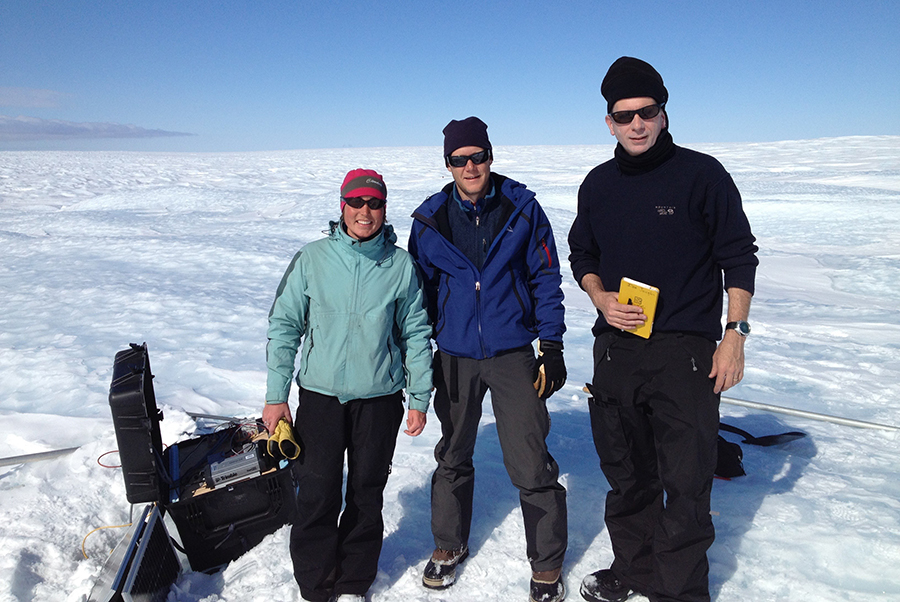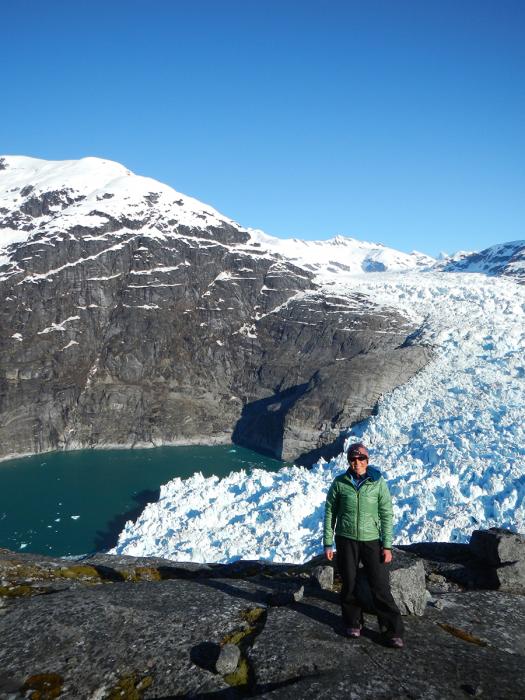Studying effects of climate change on glacial ice

On a college study abroad trip, Twila Moon stood near a large valley glacier in Nepal. She heard the glacier melting, and dripping, and ice shifting.
“I thought it was the most interesting, magical thing,” said Twila, who works at the National Snow & Ice Data Center and Cooperative Institute for Research in Environmental Studies at the University of Colorado.
She was enthralled — and went back to school to become a glaciologist. Now, Twila, an Intel ISEF 1996, 1998, and 1999 finalist, studies climate change’s effects on glacial ice.
Read our interview with Twila below to learn more about her research and why science is so important.
The work I do helps us understand where we’re going to have coastal flooding and how ocean circulation might change.
ON STUDYING EARTH’S ICE: I get to study things that I think are amazing. I get to do work that I love. I get to discover new things, which feels remarkable. My brain is constantly being challenged and stretched, which is really fulfilling. And I get to study Earth’s ice, which is a dream come true for me!

PHOTO COURTESY OF Christian Kienholz.
HOW SHE BECAME A GLACIOLOGIST: My interests moved around. I was interested in computer science. I thought I’d study math or physics. Even when I got to college, I wasn’t completely sure what it was I wanted to study. I thought about environmental engineering or Earth systems.
But then I went on a study abroad trip in Nepal. I was so lucky to get to have that experience. That’s where I saw my first big valley glacier. I thought it was the most interesting, magical thing. But I could hear the valley glacier melting, and dripping, and ice shifting. I was totally enthralled. I went back to school and said, “I’m going to be a glaciologist.”
I’d been studying a little bit of geology, where the change in rocks happens over really long time scales, hundreds, thousands, millions of years. And ice is a crystal, so it shares a lot of things with rock. I could work with ice as a geologist. There weren’t glaciology classes in my college, so my advisor recommended I take technical classes like math and physics. I got in touch with a couple of glaciologists who I could find looking up papers, and asked if they had some data I could play with for my senior research project.
All of us live here [on Earth] and all of us depend on it.
I was studying glaciology at a time before climate change was big. Today, students come to me interested in it in part because they want to study something related to climate change, as a way to help. Of course, when your life career is studying Earth ice, you’re quickly involved in climate science.
WHY STUDING EARTH’S ICE IS IMPORTANT: One of the most important things to know in science, and observational science, is that you can’t understand what is going to happen next. It’s about trying to understand how the Earth works, which is a super exciting problem but also a really important problem. Because all of us live here and all of us depend on it.
We sometimes think we know what we might find, but there are so many examples of scientists being surprised. Having a hunch is not the same thing as having an answer. Our job is to go out there and test things, and explore, and understand so that we can help people.
When your life career is studying Earth ice, you’re quickly involved in climate science.
The work I do helps us understand where we’re going to have coastal flooding, sea level rise, and understand how ocean circulation might change, which is important for hunting, fishing, and marine life. All of these different elements are connected. There’s no getting around it. Being able to understand how they work is how we can interact better and respond or help shape the future.
THE CHALLENGING PART OF BEING A GLACIOLOGIST: These days, the most challenging part is that we see such clear signals of ice loss, and not having climate science fully embraced. Feeling like I’m observing things that are disappearing and people aren’t necessarily understanding that or doing more action to try to change it — that’s really tough. I’m a very happy, optimistic kind of person, which I’m thankful for, because doing anything related to climate science can be a really difficult science to be in.
Science fair taught me how to undertake a science project myself, come up with an idea, figure out how to get over the bumps.
THE IMPORTANCE OF SCIENCE FAIRS: There’s no question that my science fair involvement was a huge part of me choosing to become a scientist in my career. It was something that I really enjoyed in middle school and became more active in, in high school.
Science fair taught me not just about the science we learn in the classroom, but really how to undertake a science project myself, come up with an idea, explore it, figure out how to get over the bumps you might run into. And the opportunity at Intel ISEF to meet and talk with other people who have interests like me and to discover a science community, that was a really big influence on me. I was able to see that it could really take me places.
Read more about Twila’s research at her website Changing Ice.
HOW SHE FIRST BECAME INTERESTED IN STEM: I was a little kid who was very curious. I loved binoculars and looking closely at things. I had a wonderful science teacher in middle school who made sure that we did really fun, interactive lab work like going out and measuring things in creeks and streams.
I was a little kid who was very curious. I loved binoculars and looking closely at things.
That was also when I first started participating in science fairs. I just loved it. I liked getting to decide something to explore myself. I really liked the process of going and talking to people about it, presenting.
HER MOST MEMORABLE EXPERIENCE AT INTEL ISEF: The opportunity to go. You hardly get any sleep, you spend all your time chatting with other people, telling stupid STEM jokes, just talking about science ideas. I remember at one [Intel ISEF] I went to, maybe the first, meeting a guy who was really excited about this idea of growing up and being one of the people who helps create ways to help the blind see by directly connecting with their internal neural networks. Just exciting things like that that I didn’t get to talk about on a regular basis. It was easy to meet people and make friends.
[At Intel ISEF,] you hardly get any sleep, you spend all your time chatting with other people, telling stupid STEM jokes, talking about science ideas.
HER ADVICE TO YOUNG PEOPLE INTERESTED IN STEM: My general advice is to do really well at whatever you’re doing right now. Really focus on the thing you’re doing right now. If you’re doing great at what you’re doing now, people are going to notice, be excited to help you out, and you’ll get good recommendations.
There can be periods where it’s really hard. As you go from being a great student and into being more of a scientist, you hear the word “no” more often. But if you stick with it, it can be really fulfilling. I feel very lucky to be in this profession.
Today there are all sorts of different jobs in the world that didn’t exist 10 years ago. And 10 years from now, there will be a whole other set of interests and jobs.
Explore your curiosity and your passion. We can forget that today there are all sorts of different jobs in the world that didn’t exist 10 years ago. And 10 years from now, there will be a whole other set of interests and jobs. It’s OK if you don’t see an example of that one thing you want to do right now. Getting to explore and discover is really thrilling. It stays that way. It just becomes more exciting.


